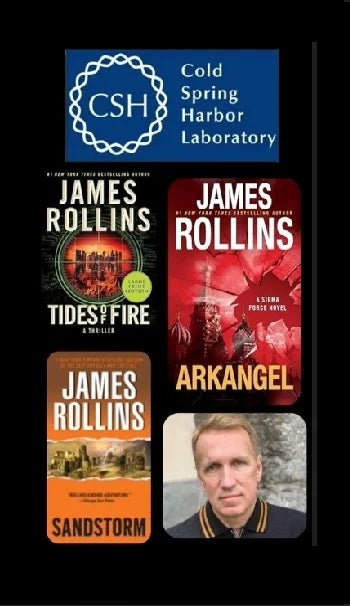James Rollins in Conversation with Cold Spring Harbor Laboratory (Free ZOOM event)

When
Date: Friday, June 13, 2025
Time: 7:00 pm - EST
+ iCal export + Add to Google Calendar
Description
Science Fiction and Techno-Thriller author James Rollins will engage in a discussion with scholars from Cold Spring Harbor Laboratory, Kyle Daruwalla and Christian Pehle, focusing on topics related to NeuroAI through Zoom on Friday, June 13th at 7pm EST/4pm PST. Biographies of the attending scientists are provided below.
THIS EVENT IS FREE TO ATTEND. SHOULD YOU DESIRE TO PURCHASE ONE OF JAMES ROLLINS' BOOKS, YOU MAY DO SO THROUGH THE LINK ON THE WEBSITE AT THE END.
PLEASE BE AWARE THAT THIS AUTHOR EVENT WILL BE HELD ONLINE VIA ZOOM!
ZOOM link for event:
https://us06web.zoom.us/j/81321993726
Meeting ID: 813 2199 3726
Have a question for James Rollins or the Cold Spring Harbor Laboratory Scholars? Click the like right below for a question form! There will be an interactive Q&A portion during the discussion.
Click here to ask your question!
ABOUT THE AUTHOR
James Rollins is the author of international thrillers that have been translated into more than forty languages. His Sigma series has been lauded as one of the “top crowd pleasers” (New York Times) and one of the “hottest summer reads”
(People magazine). In each novel, acclaimed for its originality, Rollins unveils unseen worlds, scientific breakthroughs, and historical secrets—and he does it all at breakneck speed and with stunning insight. He lives in the Sierra Nevada.
About Kyle Daruwalla
Kyle Daruwalla is a NeuroAI scholar at Cold Spring Harbor Laboratory. Previously, he completed his B.S. in Computer Engineering and Mathematics at Rose-Hulman Institute of Technology, then his M.S. and Ph.D. in Electrical Engineering at University of Wisconsin-Madison. His research brings together perspectives from computer science, machine learning, and neuroscience. Specifically, Kyle studies how evolution and neural development can guide us to produce artificial intelligence that learns with less data and fewer energy resources. He also works with the Hou Lab at CSHL to study facial expressions in rodents. Outside of the lab, he enjoys playing guitar, woodworking, and hiking with his dog, George. Watching George learn is a constant source of curiosity and inspiration for Kyle.
About Christian Pehle
Christian Pehle is a NeuroAI scholar at Cold Spring Harbor Laboratory. Previously, he completed his PhD in Physics at Ruprecht Karl University of Heidelberg, Germany. Christian explores how the human brain can inspire more efficient artificial intelligence. His current research tackles a fascinating puzzle: why do our brains run on about as much power as a light bulb, while AI systems need massive data centers? He uses advanced mathematics and physics to understand this remarkable efficiency.
During his PhD, Christian built a computer modeled after the brain, that runs a thousand times faster than our brain while mimicking how brain cells communicate and learn. The software he created to train this "brain-like" computer is now used by multiple organizations including the European Space Agency to analyze satellite imagery.
His latest breakthrough could revolutionize AI: a learning method that dramatically reduces the energy needed to train artificial neural networks—by up to a thousand times. The key is to take inspiration from how infrequently brain cells communicate — this enables the low power consumption of biological brains.
Christian's research represents a fundamental shift in how we build intelligent machines. Instead of brute-forcing AI with massive computing power, he's teaching computers to think more like brains—processing information only when needed, learning from sparse data, and adapting on the fly. This approach could make the current generation of energy-hungry AI obsolete, replaced by systems that are not just smarter, but genuinely intelligent in their use of resources.
Christian's appreciation for natural intelligence extends beyond the lab—whether observing his cat's remarkably efficient hunting instincts or finding clarity during long hikes in the mountains.